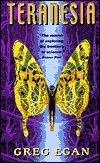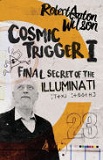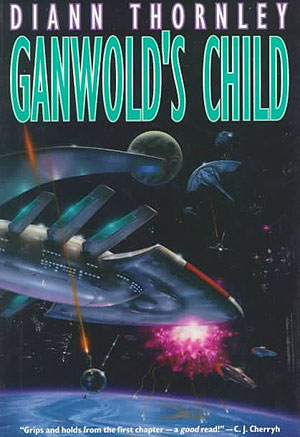
Teranesia, by Greg Egan
Book Review by Jonathan M. Sullivan
Have you read this book?
This book takes a slightly different tack on one of my favorite science-fictional themes: the evolution of the human race. Ever since I first read Dune as a pimple-faced boy, I've thought that science fiction was at its best when it depicted humanity undergoing a Big Change. But that's not enough for great fiction; after all, a history book does that. You have to show the Big Change through its impact on individuals.
In Teranesia, Egan weaves together exotic settings, unusual characters, and fairly solid science to tell a story that really boils down to a troubled young man coming to terms with himself. Prabir Suresh is growing up with his kid sister on a sort of high-tech Gilligan's Island, an unmapped speck in the middle of the Indonesian archipelago which they've dubbed Teranesia. His parents, both scientists, are investigating anomalous mutations in local butterfly species. Prabir's idyllic existence is shattered by the outbreak of an Indonesian civil war, the violent death of his parents, and a harrowing escape from the island. Egan does a beautiful job of depicting how a precocious pre-adolescent boy would act, think and feel under these circumstances, and in doing so he binds the reader emotionally to Prabir's fate.
Twenty years later, Prabir and his sister Madhusree are pursuing their own careers in biology. Prabir is mired, intellectually and emotionally. He's struggling to reconcile himself to his own homosexuality, which he tends to look at as a sort of evolutionary indulgence. In a particularly compelling passage, Egan uses dialog between Prabir and his lover to spin out a beautiful and thoughtful treatise on human sexuality. Prabir is also trying to adapt to Madhusree's growing independence. Since the escape from the island he's always been protective of her, and now she's running off to Indonesia as part of an expedition to investigate the sudden and inexplicable appearance of new species.
This situation confronts Prabir with a crisis of character. He fails, choosing to chase after his kid sister and bring her back to safety. But this choice will ultimately provide Prabir with the opportunity to confront deeper issues, and not incidentally play a part in solving the mystery of Teranesia. As he chases his sister across the Archipelago, accompanied by a hard-as-nails mercenary scientist, we watch the puzzle unravel. Species across the region are responding to environmental stressors by a sort of reverse-evolutionary process, in which fossil genes are reactivated, transcribed, and translated into new proteins that change the phenotype of the organism. Rather than try to come up with new genes to respond to precipitous challenges in the environment, species are merely dusting off genetic strategies that worked for their ancestors during similar crises in eons past. The problem for Prabir--and everybody else--is that this novel evolutionary process appears to be catalyzed by a semi-intelligent mutagen, the San Paulo protein, and that mutagen appears to be contagious. It's inevitable, of course, that it breaks into the human population, and that it does so through Prabir.
That creates a final technical problem for Egan to solve, in terms of both science and plotting. This novel demonstrates Egan's usual attention to detail, but there are some minor problems with the biology. The San Paulo protein catalyzes a not-altogether-plausible transformation of Prabir's body, and prompts his sister to formulate a not-altogether-plausible therapy. But the reason this depiction of Prabir's unlikely physical transformation works at a fictional level has nothing to do with the science. It works because it's a beautiful and resonant reflection of Prabir's spiritual transformation, and because Egan has connected us so solidly with his characters.
Notwithstanding my minor technical quibbles, Teranesia is first-rate hard science fiction, not because it's a terrific story about the evolution of life on earth, or the evolution of humanity. It's first-rate science fiction because it's a terrific story about the evolution of a man named Prabir Saresh.
Sully dog is the editor and publisher of the ezine Neverworlds.
In Teranesia, Egan weaves together exotic settings, unusual characters, and fairly solid science to tell a story that really boils down to a troubled young man coming to terms with himself. Prabir Suresh is growing up with his kid sister on a sort of high-tech Gilligan's Island, an unmapped speck in the middle of the Indonesian archipelago which they've dubbed Teranesia. His parents, both scientists, are investigating anomalous mutations in local butterfly species. Prabir's idyllic existence is shattered by the outbreak of an Indonesian civil war, the violent death of his parents, and a harrowing escape from the island. Egan does a beautiful job of depicting how a precocious pre-adolescent boy would act, think and feel under these circumstances, and in doing so he binds the reader emotionally to Prabir's fate.
Twenty years later, Prabir and his sister Madhusree are pursuing their own careers in biology. Prabir is mired, intellectually and emotionally. He's struggling to reconcile himself to his own homosexuality, which he tends to look at as a sort of evolutionary indulgence. In a particularly compelling passage, Egan uses dialog between Prabir and his lover to spin out a beautiful and thoughtful treatise on human sexuality. Prabir is also trying to adapt to Madhusree's growing independence. Since the escape from the island he's always been protective of her, and now she's running off to Indonesia as part of an expedition to investigate the sudden and inexplicable appearance of new species.
This situation confronts Prabir with a crisis of character. He fails, choosing to chase after his kid sister and bring her back to safety. But this choice will ultimately provide Prabir with the opportunity to confront deeper issues, and not incidentally play a part in solving the mystery of Teranesia. As he chases his sister across the Archipelago, accompanied by a hard-as-nails mercenary scientist, we watch the puzzle unravel. Species across the region are responding to environmental stressors by a sort of reverse-evolutionary process, in which fossil genes are reactivated, transcribed, and translated into new proteins that change the phenotype of the organism. Rather than try to come up with new genes to respond to precipitous challenges in the environment, species are merely dusting off genetic strategies that worked for their ancestors during similar crises in eons past. The problem for Prabir--and everybody else--is that this novel evolutionary process appears to be catalyzed by a semi-intelligent mutagen, the San Paulo protein, and that mutagen appears to be contagious. It's inevitable, of course, that it breaks into the human population, and that it does so through Prabir.
That creates a final technical problem for Egan to solve, in terms of both science and plotting. This novel demonstrates Egan's usual attention to detail, but there are some minor problems with the biology. The San Paulo protein catalyzes a not-altogether-plausible transformation of Prabir's body, and prompts his sister to formulate a not-altogether-plausible therapy. But the reason this depiction of Prabir's unlikely physical transformation works at a fictional level has nothing to do with the science. It works because it's a beautiful and resonant reflection of Prabir's spiritual transformation, and because Egan has connected us so solidly with his characters.
Notwithstanding my minor technical quibbles, Teranesia is first-rate hard science fiction, not because it's a terrific story about the evolution of life on earth, or the evolution of humanity. It's first-rate science fiction because it's a terrific story about the evolution of a man named Prabir Saresh.
Sully dog is the editor and publisher of the ezine Neverworlds.
| Teranesia, by Greg Egan on Amazon |
Teranesia, by Greg Egan on Amazon

| More Books You Might Like |
Comment on Teranesia, by Greg Egan




